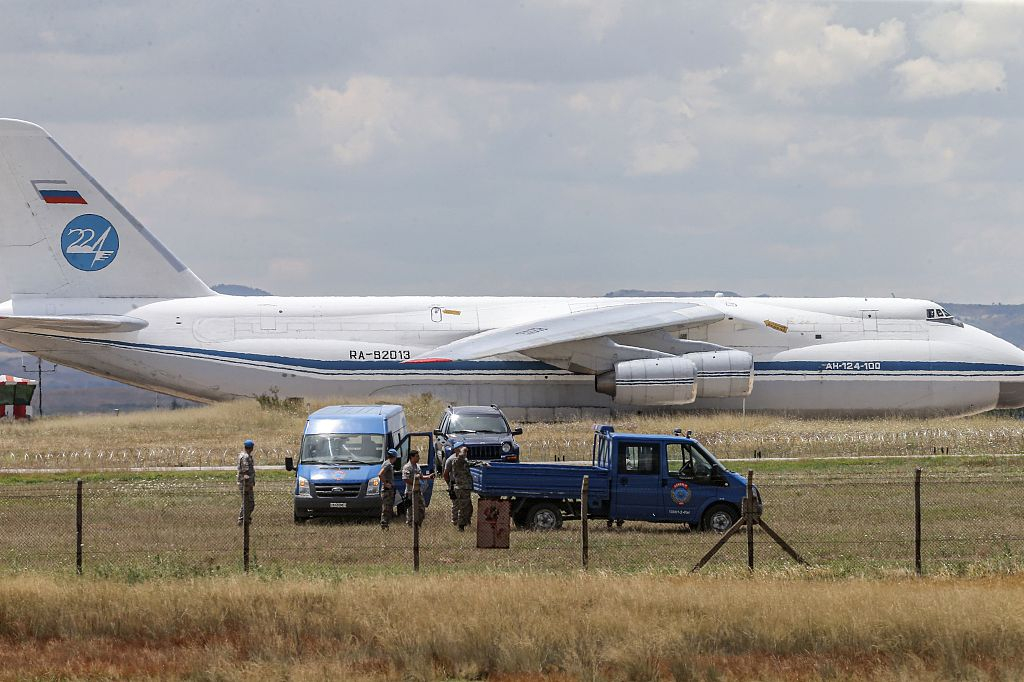By Hannan Hussain

Editor's note: Hannan Hussain is a foreign affairs commentator and author. He is a Fulbright recipient at the University of Maryland in the U.S., and a former assistant researcher at the Islamabad Policy Research Institute. The article reflects the author's opinions and not necessarily the views of CGTN.
Days after Turkey's defense minister Hulusi Akar sought to advance strategic reconciliation with Washington on the deployment of Russian-manufactured S-400 air defense systems, both parties are set to fall short of a strategic compromise. The Joe Biden administration centers its critique on the S-400 posing a threat to NATO's technological interests, while Turkey considers its defense autonomy with Moscow a sovereign pursuit, devoid of any immediate concessions.
Note that both zero-sum choices emerge in the absence of the U.S-Turkey S-400 joint working group, a proposed mechanism for high level diplomacy that could cede unexploited bargaining space, including important counter-terrorism leverage.
Turkish defense minister Akar and government officials have already suggested a limited S-400 deployment if Washington ended its collaboration with Syrian Kurdish forces, viewed by Ankara as a mortal security threat. Given that Biden is in the process of leading a differentiated Syria policy, Turkish motivations to muster an additional S-400 defense layer is part of its own restructuring of regional security priorities, indicating possible convergence.
The Kurdish-led Syrian Democratic Forces (SDF) continue to serve U.S. interests against a fragmented ISIL umbrella in the region, at a time when punishing Damascus with economic sanctions is no longer a fit U.S. counter-terrorism tact. The U.S.-SDF partnership also peaked once the ISIL's clandestine network of cross-border insurgency operations remained heavily concentrated on the Iraq-Syria territorial split.
Today, the reality is different. The successes of the U.S.-SDF cooperation have outnumbered the ISIL challenge, supporting Turkey's expectation that the U.S.-SDF partnership could be re-calibrated.
As a result, the uninitiated S-400 working group framework is critical to determining whether Turkey's S-400 deployment would actually "endanger the integrity" of U.S.-backed multilateral alliances, or whether Washington's denial of sanctions relief would serve its best national security interests. Both parameters enjoy legal precedent in Capitol Hill under the 2018 Modified Waiver Authority, Section 231 of CAATSA.
CAATSA – the Countering America's Adversaries Through Sanctions Act – was the tool used by the Donald Trump administration to sanction Turkey for its S-400 acquisitions late last year. Recent events show that Washington has engaged the likes of New Delhi through inter-ministerial dialogue, in a bid to evaluate similar CAATSA sanctions and eligibility criteria.
Turkey is also correct to argue that it is not a NATO exception in acquiring sensitive air defense technologies. Over the years, several member states have procured similar technologies from foreign states, but have not been forced to bite the bullet on deployment.

Precisely for this reason, the Biden administration should distinguish its reservations to dialogue from that of the Trump administration, where a broader anti-Ankara hardline deepened diplomatic fractures within NATO. In effect, these fractures empowered Turkey to consolidate more ground on autonomous defenses, explaining Ankara's limited enthusiasm to retreat on the S-400 issues.
In a welcome sign, U.S. national security adviser Jake Sullivan's scheduled exchange with Turkish presidential spokesman Ibrahim Kalin gathered steam this week, and a parallel negotiation track from Ankara is set to usher an added layer of foreign ministerial correspondence.
"When we read the strategic picture the right way, we think we can make advances," said Kalin in a recent interview. "By proposing solution ways, we [Washington and Ankara] will be in negotiations."
In terms of leverage, there is little doubt that U.S.-Turkey ties have witnessed significant strain in recent years. But the broader takeaway is this: overdrawn Congress skepticism towards S-400 systems was as much a factor in complicating relations, as was the conflict landscape in Syria – supporting Turkey's claim that a Kurdish-led SDF condition could test the waters on defense system concessions. As both counter-terrorism and defense security priorities enjoy equal footing in recent history, it makes sense to revisit the centrality of U.S. support to the People's Protection Units and sidestep long-term fissures.
This leaves one fundamental question unanswered: how to consolidate U.S.-Turkey trust on sensitive negotiations?
Look no further than Greece, a powerful NATO ally. It procured Russia's older S-300 defense system in the 1990s, only to reach a compromise on the grounds that Ankara periodically envisioned. Turkey has also repeatedly argued that the autonomously acquired systems would serve a preemptive purpose, not an assertive one. This includes the specific "state of threats" in the region – a common security posture for any responsible state.
As a result, building on the Greek model is likely to gain more traction within NATO ranks, satisfying part of U.S. security apprehensions towards the S-400 deployment. At the same time, Turkey can contemplate branching off into counter-terrorism concessions with the Biden administration, once the S-400 joint working group gets some teeth.













